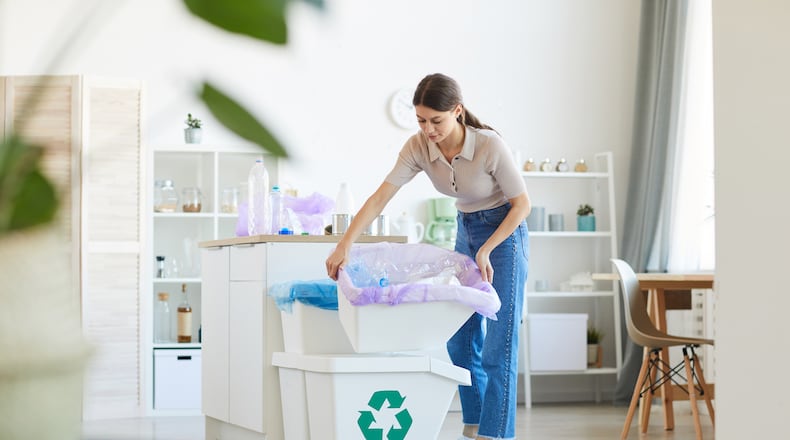Is there something I could do instead of tossing the aforementioned recyclables into the trash? Absolutely.
Two days ago as of this writing, I was staring down the depths of a nearly empty can of generic coffee. There was enough for one heaping scoop, but not enough to fill the perforated basket of my percolator. My vague reflection in the shiny tin got me thinking: where will this can end up?
According to the Environmental Protection Agency, 292.4 million tons of trash was generated in the United States in 2018 alone. Of that, 146.1 million tons ended up in landfills. This empty coffee can weighs a fraction of those numbers, which can easily make a person casual to their own efforts of waste management.
I snooped around the unexplored territories of my complex, searching for the slightest hint of a blue bin to throw the can into. After discovering nothing, I headed to the manager’s office to ask if I was missing something. A sign on the window said the staff would be back around 12:15 p.m. It was 24 minutes after and the door was still locked. As I peered inside, I was approached by an unnamed and semi-concerned maintenance employee.
I asked her if there were recycling bins around, and she confirmed that trash was the only option. I asked about nearby recycling centers, and she said she wasn’t from around here and didn’t know the answer.
This same issue happened when I lived in an apartment complex on Whidbey Island, Wash. For nearly 8 months of my stay, recycling eluded me. There were two dumpsters and no blue bins; the information on how to recycle locally was hazy at best.
That said, a quick Google search informed me the closest recycling center happened to be less than a mile down the road. Knowing that I became overly diligent and obsessed with the idea of recycling, almost to the point where I could describe it as a hobby.
Turning to Google once again, I called Rumpke Waste & Recycling to start the process of getting a blue bin.
The representative informed me that there is no recycling option for individual apartments; however, speaking with the manager of the complex could lead to a complex-wide service. Ultimately, I was aware the cost of another dumpster, specifically for recycling, would inevitably raise the rent, and residents would largely prefer lower rents to a convenient recycling option.
Upon further research, the closest recycling center for me is the Montgomery County Transfer Station in Moraine, which is a 12-mile round trip from my apartment. And since I only have this coffee can to recycle — because everything else made it to the dumpster — a trip seems like a complete misappropriation of gas.
There are fewer steps, often literally, to the dumpster, so it’s easy to fall into thinking that one trashed item is just a drop in the bucket; like a pill in some wet dog food, it won’t be noticed.
I spoke with a driver for a waste management company that serves the local area. I’ll refrain from using his name and refer to him as Chuck.
“I get anywhere from 7.5- to 10.5-tons of trash a day,” Chuck said. “That’s me. That’s one truck. That’s just one company.”
When I tell Chuck about my mission to valiantly recycle my coffee can, he more or less recommends finding a random recycling bin to toss my coffee can into — which is technically illegal and a theft of service (and partly why I’m keeping his name safeguarded).
“When it comes to producing less waste in the world, it’s something that is so far beyond the capabilities of any single individual,” he said. “It’s blunt, but it’s irrelevant whether you — individual Brandon Berry — are recycling or not. It does not tip the scale any one way, shape or form.”
Most waste, Chuck explains, is generated by companies. He’s seen this first-hand working in factories, warehouses and now in waste management.
“A single business might put out 15 to 20 tons of trash every week,” Chuck said. “No single human being could possibly put out that much trash.”
Hearing that doesn’t make me want to recycle any less, nor should it prevent anyone else from doing it. Chuck stresses that recycling is still crucial, despite it being more of a structural issue than an individual issue. My original concerns, however, are the hoops that we, as non-home-owning apartment people, have to jump through to do our part.
Making a weekly, bi-weekly or even monthly trip to the nearest recycling center is not always feasible, especially if transportation is an issue. It should not cost extra to make a difference, but it does. The logistics should not be labyrinthal, but they are.
This apartment complex has around 100 units, none with ready access to a recycling bin. Even if I, individual Brandon Berry, start recycling again, there might be 99 — in this immediate area — who won’t. This is one complex in one city in one part of the world. Waste is everywhere because sometimes it feels more convenient to simply throw stuff away.
To tip the scale, we have to start somewhere — even if it’s with a generic coffee can.
About the Author

